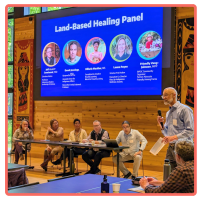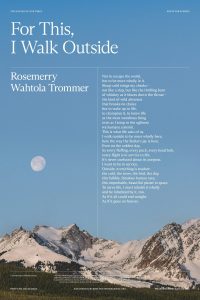2025 NW Nature and Health Symposium

On May 21, 2025, more than 100 students, researchers, healthcare professionals, and community advocates joined together for our 8th annual symposium. We came together with a shared purpose—to deepen our understanding of the profound connection between nature and human well-being and to advance bold, inclusive strategies that ensure everyone has access to the healing power of green and blue spaces—especially those who have long carried the undue weight of environmental and social injustice.
Since 2017, the Center has been hosting public symposia to spur an enduring nature and health movement and inspire new programs and policies that expand equitable engagement with nature. Our invited speakers work hand-in-hand to understand the needs of communities who have borne the brunt of social and environmental injustices, who work to address health and access inequities, and who bring critical insights and perspectives on environmental history as well as outdoor recreation. If you’d like to recommend a speaker for a future symposium, please reach out.
Invited Speakers
During the 2025 symposium, five speakers shared their research and programs that are advancing the health of people and the planet.
 Coco Alarcón
Coco Alarcón
Landscape Architect | Global Health | University of Washington
Three Communities One River: Indigenous Perspectives on Nature, Health, and Urban Development in the Peruvian Amazon
The city of Iquitos, in the Peruvian Amazon, is home to the largest concentrations of Indigenous communities in the world. Around 120,000 Indigenous residents live along the river floodplains, adapting to the dynamic rhythms of the Amazon River. Contemporary policies and urban development present challenges to the inclusion of this way of life in future city planning and government relocation efforts. This project gathered Indigenous perspectives from three different communities to understand how their current conditions are affecting their relationships with nature, health, and their visions for the future.
Gregory stepped in for Quincy Henry of Campfire Coffee who needed to tend to an emergency. We hope to host Quincy at a future symposium.
 Gregory Bratman, PhD
Gregory Bratman, PhD
Associate Professor | School of Environmental and Forest Sciences | University of Washington
Nature Contact and Human Well-Being
This talk explored emerging work at the intersection of environmental psychology and exposure science, focusing on the effects of nature contact on human well-being. It included a discussion of studies on cognitive function and affect, along with new investigations into multisensory mechanisms. The presentation also introduced a framework for applying this evidence in decision-making and urban planning.
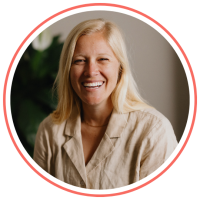
Amy McDonnell, PhD
Cognitive Neuroscientist | University of Utah
Using Neuroscience Methods to Understand the Influence of Nature on the Brain
Exposure to nature is thought to improve our ability to focus. Recent neuroscience work has begun to uncover what is happening in the brain to drive these benefits. This talk provided an overview of how (and why) we employ these methods to understand the influence of immersion in nature on brain functioning related to attention.
 Esther Min, PhD, MPH
Esther Min, PhD, MPH
Clinical Assistant Professor | University of Washington
Director of Environmental Health Research Partnerships | Front and Centered
Environmental J******: What’s Ahead and What’s Our Role?
Esther discussed recent progress and examples of environmental and climate j****** work in Washington State, the challenges and opportunities that the movement faces today, and the role of community-academic partnerships in environmental j****** in the future.
 Daniel Winterbottom, RLA
Daniel Winterbottom, RLA
Landscape Architect | University of Washington
Turning Gray to Green: Rethinking the Carceral Environment
As intentionally designed places of healing, therapeutic gardens restore users “to an unimpaired or improved condition”, lower rumination, increase focus, lower stress, and reduce depression. Those most bereft of nature interactions, in secure facilities with little access to natural settings such as correctional facilities, mental hospitals and detention camps, may benefit most. These conditions, often the direct result of inequity, are global and yet a remarkably marginal focus of the design professions. Individuals residing in environments of containment suffer from higher rates of stress, anxiety, depression, and violence.
This project explored several questions:
- What role does, and can, nature interactions play to reduce the effects of incarceration and containment?
- How can landscapes of incarceration be made more ecological and therapeutic, reduce recidivism and improve mental health?
- What are successful models that reduce the traumatic effects of incarceration using nature based interventions?
Land-Based Healing Panel
Land-based healing has been defined as purposefully centering healing upon the land and supplementing with western approaches (Johnson-Jennings et al., 2020), which inherently considers multiple levels of influence by focusing on the bidirectional influence of environment, or land, on human health. This panel was moderated by Derek Jennings (Quapaw/Sac & Fox), PhD.
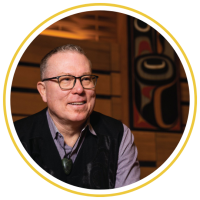 Jeff ᎦᏃᎭᎵᏙ Corntassel, PhD
Jeff ᎦᏃᎭᎵᏙ Corntassel, PhD
Cherokee Nation
Professor | Indigenous Studies | University of Victoria
Jeff’s research and teaching interests focus on “Everyday Acts of Resurgence” and the intersections between Indigenous internationalism, community resurgence, climate change, gender, and community well-being.
 Derek Jennings, PhD
Derek Jennings, PhD
Quapaw/Sac & Fox
Associate Dean for Indigenous Affairs | UW School of Public Health
Bezruchka Family Endowed Professor | UW School of Public Health
As a tribal nations member, Derek works primarily with Indigenous communities as a health educator, addressing the social determinants of health related to food, diet, and improving diet. He uses imaged-based and community-based participatory research methods to engage Indigenous communities throughout the research processes.
 Hillarie Maddox, MS
Hillarie Maddox, MS
Consultant & Creative | Rewild Learning + Black Girl Country Living
Hillarie is a community weaver, educator, and experience designer who explores the intersections of land, learning, and liberation. Born and raised in the Black Hills of South Dakota, she comes from a lineage of earth stewards and caregivers, deeply influencing her lifelong commitment to community and environmental justice.
 Launa Payne
Launa Payne
Xa’xtsa First Nation
Executive Co-Director | Rise Up Indigenous Wellness
Launa is an Indigenous educator with a focus on outdoor education. She has published two books on Indigenous teachings and connection to the land: Heartbeat of the Earth: Connecting Children to Nature through Indigenous Teachings and Whispers of the Earth: A Journey through Indigenous Wisdom.
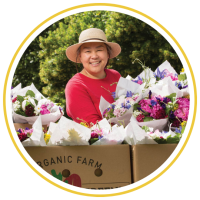 Friendly Vang-Johnson, MPP
Friendly Vang-Johnson, MPP
BIPOC Community Organizer | Farmer Advocate | Friendly Hmong Farms
Friendly manages Friendly Hmong Farms, leveraging her 20+ years of experience in social justice work. Her understanding of the intersection between food sovereignty, land reparations, and racial justice was shaped by a childhood growing up in the Frogtown neighborhood, farming in the summers, and at the markets with her mom and grandmothers in Minnesota.
Poetry Gallery
A poetry gallery from The Nature of Our Times helped sparked creativity, hope, and shared connection. The Nature of Our Times is a companion to the first national assessment of U.S. lands, waters, and wildlife by United by Nature (formerly the U.S. National Nature Assessment or NNA1). Rooted in the belief that story and art are powerful tools for collective healing, the gallery invited us to slow down, reflect, and reconnect with the living world—and with one another. It was a beautiful reminder that imagination is essential in shaping a more just and sustainable future.
The posters featured poems from Jane Hirshfield, Alison Deming, Moudi Sbeity, Rosemerry Wahtola Trommer, Jaleel Shujath, Naomi Shihab Nye, Anna Lena Phillips Bell, Lucian Mattison, Gabriela A. Igloria, and Martha Silano. These poems and 194 others will appear in the forthcoming print anthology, The Nature of Our Times: Poems on America’s Lands, Waters, Wildlife, and Other Natural Wonders. The online gallery showcases over 1,300 poems, with submissions open on a rolling basis.
Sponsors
We are incredibly grateful to our amazing sponsors for their unwavering support of the 2025 Nature and Health symposium and their tireless efforts to help build an enduring nature and health movement. If you are as passionate about advancing the Center for Nature and Health’s groundbreaking work, please consider making a gift. Together, we can create a world where everyone can equitable engage with nature and its benefits!
 REI Cooperative Action Fund
REI Cooperative Action Fund
The REI Cooperative Action Fund brings together the collective strength of the outdoor community to support organizations that advance inclusivity, access and belonging outside. The REI Fund announces new investments each year in the spring and the fall to provide unrestricted funding to nonprofit partners across three specific areas: connecting people outside, creating space outside, and centering health outside.
 Mental Insight Foundation
Mental Insight Foundation
To assist people in developing healthier mental attitudes and to promote meaningful insights into the human mind.


